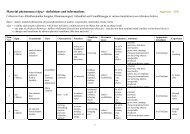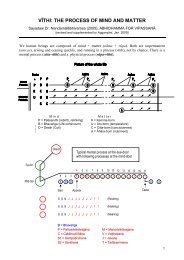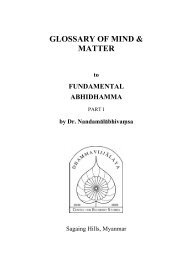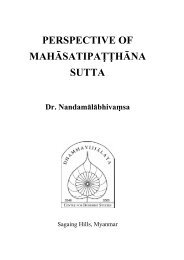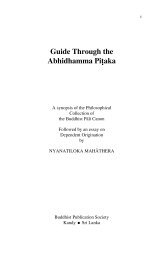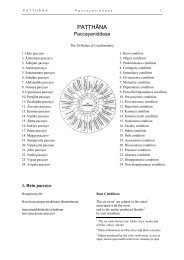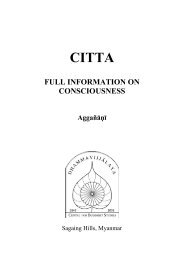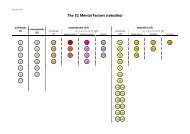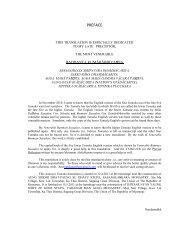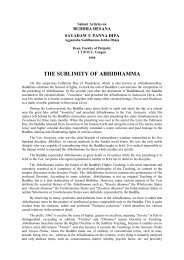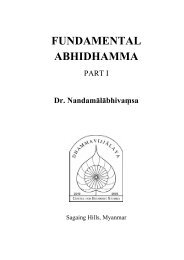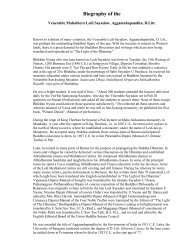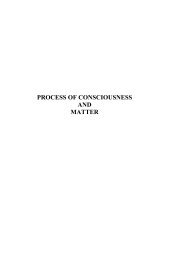ABHIDHAMMA IN DAILY LIFE - Abhidhamma.com
ABHIDHAMMA IN DAILY LIFE - Abhidhamma.com
ABHIDHAMMA IN DAILY LIFE - Abhidhamma.com
Create successful ePaper yourself
Turn your PDF publications into a flip-book with our unique Google optimized e-Paper software.
teaching. Our Buddha has expounded the absolute truths such as :<br />
1. The law of Impermanence – “ Impermanence – anecca , Suffering – dukha , Non-self<br />
anatta (non-self);<br />
2. The Four Noble Truths, and<br />
3. The law of dependent Origination - Paticcasamuppada,<br />
Worldlings will find it hard to identify the latent delusion with their limited knowledge. Even<br />
when one attains the holiness from the beginning stage of Stream-winner (Sotapanna), Oncereturner<br />
(Sakadagami) or Non-returner (Anagami) this latent delusion would be erased<br />
<strong>com</strong>pletely only when one attains the arahantship.<br />
b. Reactive delusion - Pariyutthana Moha<br />
Delusion that arises shortly with a delusion is a reactive delusion and is in most cases as the bad<br />
mind, the unwholesome one. Therefore, even the learned and virtuous cannot see the evils of this<br />
reactive delusion and will react wrongly.<br />
Example:<br />
There was once, a Buddha-to-be- Bodhisatta, Haritaca, having renounced the world, abandoning<br />
his immense wealth of eighty crores of money, became a hermit and attained the great<br />
supernatural powers,(jhanas and abhinnas). One day, he came to Baranasi and stayed in the<br />
King's garden. The king of Baranasi was his old friend who was fulfilling the Perfections<br />
(parami) to be<strong>com</strong>e the Venerable Ananda. Therefore, as soon as he saw the hermit, he revered<br />
him so much that he asked him to stay in the royal garden and supported him with four<br />
requisites; he himself offered the hermit morning meals at the palace.<br />
Once, as a rebellion broke out in the country, the king himself had to go out to quell the<br />
rebellion. Before setting out with his army, he requested the queen repeatedly not to forget to<br />
look after the hermit. The queen did as told. One early morning, she took a bath with scented<br />
water, put on fine clothes, and lay down on the couch waiting for the hermit.<br />
The Bodhisatta came through space with his supernormal power (abhinna), and arrived at the<br />
palace window. Hearing the flutter of the hermit's robe, the queen hastily rose from her couch<br />
and her dress fell off her. Seeing the queen <strong>com</strong>promising position, naked, the latent delusion<br />
(anusaya moha), which lay dormant in his mind-continuum, rose to the stage of reactive delusion<br />
(pariyutthana moha), and filled with lust, he took the queen's hand and <strong>com</strong>mitted immoral<br />
transgression like a monster ogre.<br />
We should consider the stupidity arising through delusion (moha) in this story seriously. If such<br />
delusion did not appear in him, he would not have <strong>com</strong>mitted such an evil deed even with the<br />
king's consent. However, at that time, overwhelmed by the darkness of delusion, he was unable<br />
to see the evil consequences of his deed in the present and the future existences throughout the<br />
samsara, and consequently, <strong>com</strong>mitted that improper transgression. The supernatural power,<br />
(jhanas and abhinnas), which he had acquired through practice for all his life, were also unable<br />
Page 9 A Gift of Dhamma Maung Paw, California



